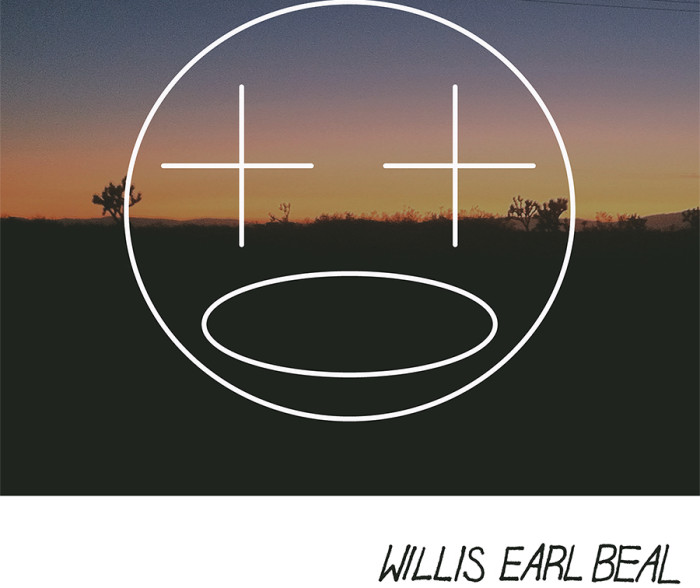Photo credit Rodrigo Melgarejo
Contact
- Press Contact: Daniel Gill at Force Field PR
[Email: daniel@forcefieldpr.com, tel: 818.331.0830]
Bio
At the end of a little dirt driveway twenty miles outside of Olympia, Washington, overlooking Lake Saint Clair, there’s a mossy manufactured home with a slouching basketball hoop out front. It belongs, for the next few weeks anyway, to Willis Earl Beal. At dusk the screen door hangs open, and inside Willis sits alone at the messy dining room table—one of the few pieces of furniture his wife left behind when she moved away—smoking a cigarette with the lights off. He is, as ever, overdressed and contemplative, and he has expressed a sincere desire to subvert his own biographical materials. “Am I important or am I not important,” he asks rhetorically. “Does it matter? And who decides that? It would be really nice to just be happy for a change, without any posturing.”
Beal has lived on this lake for the past two years, and he’s been alone here for the past few months. Lately he’s been riding the bus to downtown Olympia and spending time with strangers, some of them homeless, some of them high on drugs of indistinct origin. They know Beal as “Nobody,” a name—or the absence of one—that he gave himself some years ago in a moment of extreme clarity or career sabotage. But Olympia has seen stranger characters than Beal. “On any given day you’ll be sitting between a man named Trashcan and a woman named Dandelion, and you’ll smoke Blue Dream and time is over and everybody understands. Conversations are abstract, so you can say whatever you want to say. You can start shouting if you want to. That can be really beautiful, but it’s also extremely draining.”
Beal carries with him a small stack of hand-drawn fliers which feature a semi-psychedelic self-portrait, his phone number, and the phrase “I am nothing, nothing is everything” written on them. In smaller print is a link to his website, willisearlbeal.com, but most Olympians who’ve grown accustomed to talking with “Nobody” don’t know that he’s a musician, an actor, and an artist. They don’t know that a few short years ago, the sharply dressed 31-year-old dreamer they speak in abstractions with was giving interviews to GQ and Rolling Stone, or that he was labelmates with Adele and pegged by many as the Next Big Thing.
Before all that, Willis Earl Beal was an odd kid on the South Side of Chicago who dreamed of becoming a real-life Batman. It was a dream that wouldn’t die, so Beal signed up with the U.S. Army as a form of vigilante training. Physically, Beal could take whatever boot camp in Fort Leonard Wood, Mississippi, dished out, but his daydreaming was a problem. “I knew deep down, going in, that I must have been stupid or crazy or something. But I had suppressed everything real and created this fake reality,” he says. “When that finally broke down, I lost part of myself.” Beal says he faced intense harassment, which in turn aggravated gastrointestinal problems that would later require surgery. He was discharged and he returned to Chicago, a city he hated, to a disappointed family.
With no money or direction, Beal made his way to Albuquerque, New Mexico, to find himself again. He was homeless, but worked odd jobs and scraped together money for his first apartment. That’s where he began recording raw, lo-fi albums with hand-drawn covers, which he’d leave at coffee shops and “other places that the cool people hung out.” He met a girl, fell in love, then broke up and returned to Chicago, heartbroken. Beal’s music and artwork from Albuquerque, though, made its way to Found magazine, then to influential UK label XL Recordings. He signed with XL’s Hot Charity imprint in 2012, and the label offered him a generous advance, part of which Beal would use to move to New York, where he reunited with Jessica, the girlfriend from Albuquerque.
The label released a collection of Beal’s home recording as Acousmatic Sorcery in April 2012, and flew him to Amsterdam to record a fleshed-out new studio album, Nobody Knows, in 2013. The former received mixed reviews, but the latter was praised by UK rock and roll institutions like Mojo and New Music Express, and garnered considerable favorable attention from influential blogs and magazines in the US, as well.
Beal himself, though, remained sceptical of the music industry he was suddenly a high-profile representative of, and unconvinced by his own body of work. “When I listen to that record, it sounds like a person who is trying too hard,” Beal says of Nobody Knows. “I’m singing too hard. A couple songs are mellow and I realize, damn, that’s me right there. When everything unwinds, that’s me. Everything else was some weird version of myself. And everyone around me was telling me my music was brilliant. I’d say ‘what’s brilliant about it?’”
But the money, more than the acclaim, was difficult for Beal to cope with. “I remember having $18,000 in my bank account, walking around New York with Jessica, and just being pissed off because I was going broke,” he says. “It got to the point where I’d be on the phone with my manager just asking where the next money was going to come from. One time I got $10,000 for drawing a picture of myself drinking Beck’s Beer. There’d be five thousand over here and a thousand over here, and I was really starting to think I was hot shit. I was an asshole.”
Beal felt as if he was losing his identity. Reviewers would call his music modern blues, and photographers would “take as many pictures of me smiling and looking like a soul man as possible,” he says. “I wanted an ephemeral, artistic image. I didn’t want to look like some guy out of a fucking Mark Twain book or some minstrel show.” Beal began to insist on wearing full-face masks during his photo shoots. He occasionally became hostile in live performance. He fully embraced the name “Nobody,” tattooing it on his forearm. His success was tied up in race and masculinity and celebrity, and Beal questioned all of those concepts. He moved with his girlfriend to Olympia, to experience nature and remove himself from New York City, which brought out the worst in him. He recorded two moody and atmospheric EPs, A Place That Doesn’t Exist and Curious Cool, both released against his label’s wishes.
Once Beal and XL parted ways, the songwriter began an artistic transformation entirely of his own design, from rough-edged outsider-art provocateur to the kind of mysterious crooner one might expect to haunt the outskirts of Twin Peaks. Of the scores of exceptionally mellow songs he recorded in a guest room in his lakeside home, twelve became Experiments In Time: The Golden Hour, a full-length which was entirely self-produced and recorded, but went mostly unheard, and the other twelve became Noctunes, a concept album of ambient lullabies that Willis wrote as he feared that his relationship was falling apart.
“Those songs were probably a self-fulfilling prophecy,” he says. “But at the same time, every song I ever wrote was a prophecy in one way or another. So the record is my life now, right? But the record hasn’t ended yet. Where I am right now is somewhere on the album. Prior to her leaving me, I was at the first song. After she left me I was at the second song. I’m starting to move into the middle of the album, where I’m lamenting something I felt that I lost but I’m moving towards something. I’m moving toward the end of the album.”
The twelve songs on Noctunes are moving and meditative, thoroughly soaked with mournful synth strings and simple lyricism that Beal says is intentionally minimalistic. “It sounds generic on first listen, but if you’re in the right kind of mindset, you’ll see that these simple songs mean a hell of a lot more than ‘I love you / You love me.’ I wanted to create this persona that could say everything perfectly with very little. And that’s what I managed to do with Noctunes. I’m victorious. The record, to me, is a perfect record. And I’ve realized that’s all that really counts. I listen to that thing a lot, and it helps me. I’m still learning from it.”
Beal is packing up his home on the lake. He has to be out in a few weeks. He’s heading out on tour, and then he’s thinking about moving to Portland, Oregon, where his new label, Tender Loving Empire, is based. And yet, with all the uncertainty, Beal is happy. “I think I’m probably happier now than I’ve ever been, actually, just because everything is on the table,” he says. “There’s no more holding my breath. My wife left already left me. People have forgotten about me, more or less, so I’m getting this clean start. This is how it should have been to begin with. This is how I wanted to do it. It’s on my terms. It’s normal.”
Beal’s priorities have been rearranged. His brush with fame, and disillusion with the music industry, gave Beal a new ambition that has nothing to do with moving units or panicking over his bank account. “I know it sounds falsely altruistic, but I think a simple voice like mine can serve as an example of some kind of freedom,” he says. “I’m displaced in this day and age. If I was in a different era I’d be singing with Dylan and Pete Seeger. But that’s OK. I’m going to be a social activist, and I’m going to continue to make music. I’m gonna paint some more pictures and I’m gonna write some more and maybe I’ll learn kung fu. That’s what I’m gonna do.”

Willis Earl Beal
Noctunes
(Tender Loving Empire)
Street Date: Aug. 28, 2015
Pre-order it here
Track List:
1. Under You
2. Flying So Low
3. Like a Box
4. Lust
5. No Solution
6. Stay
7. Say The Words
8. Love Is All Around
9. Able To Wait
10. Survive
11. Start Over
12. 12 Midnight
WILLIS EARL BEAL LINKS
OFFICIAL SITE
FACEBOOK




